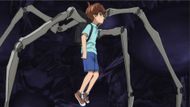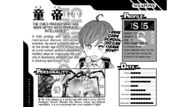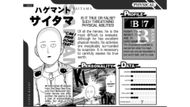One Punch Man has always appealed to admirers of its interpretation of superhero style, being inspired by extreme violence, together with satire on the strength and popularity of being a hero. This anime has a large group of heroes with their specific powers, personalities, and popularity, but little can we ever learn to know more about the unknown man who lies at the center of the plot- Saitama. Although the most powerful hero of them all, able to destroy an enemy with one blow, Saitama is practically unappreciated by the Hero Association and many of his colleagues. One such peer is Child Emperor, one of the youngest and brightest S-Class heroes, whose sensory abilities and technological genius give him an edge. Considering his keen mind and inquisitive nature, one of the main questions is whether Child Emperor is aware of the fact that Saitama has extreme and godlike abilities.
The answer would be that, despite his extreme intellectual reasoning and ability to calculate combat scenarios, Child Emperor fails to comprehend the power of Saitama in the manga One Punch Man completely. Although he appreciates power and has seen some of the amazing powers possessed by the heroes that are part of the roster, he cannot take seriously the strength of Saitama and all the banality that appears with this power. Unlike Genos or King, Child Emperor has not had enough first-hand experience to be as aware of just what Saitama can accomplish. His realism and use of evidence would result in him being unlikely to conclude that Saitama is superior to all heroes, monsters, and godlike creatures in One Punch Man without solid evidence.

Part of this ignorance is because of the organization of the Hero Association as a whole. In One Punch Man, heroes are classified according to strength, and their popularity and reputation, and their perceived accomplishments. Though Saitama takes down warriors that no other human has a shot at, he frequently accomplishes the deed with few people in sight and little recognition. This conceals his deeds and makes him underestimated by the likes of Child Emperor. Whereas Genos trains with Saitama, only to realize his power firsthand, and King has the benefit of Saitama winning his battles (accidentally), Child Emperor has never been seen in the same position, and only indirectly.

In addition, Child Emperor’s adherence to reason and technology could work against him because he is unable to believe in the uncomplicated, non-logical strength of Saitama. Child Emperor is shown as an extraordinarily knowledgeable child-genius who utilises complex technology, robotics, and tactical reasoning to offset massive odds against very strong opponents. The pieces that are so strong and Saitama doesn't even have a rational or mystical explanation could seem very unrealistic to a person like him. Saitama is, in a lot of ways, a thorn in the paw of the systems of logic and order that characters like Child Emperor thrive on. This is one of the reasons why he still fails to recognize or at least develop some suspicion towards the reality of Saitama's powers.
One Punch Man and the Limits of Recognition
The lack of Child Emperor as a total novice in matters of strength points to a repeating motif in the show: that the capability and power of a person bear no realistic correlation to how they are perceived in society. This is the case even with more major characters like Tatsumaki, Bang, and even those running the Hero Association, who all still operate within a system that ranks heroes in an artificial way that does not resemble true power. The anonymity and low ranking of Saitama prove the inefficiency of these systems since even the most observant heroes have scruples to see through the labels that the Association sets.
Child Emperor, a genius though, is still a child molded by the same structures. The way he praises heroes such as Metal Knight or is pipe-boringly respectful of S-Class higher-ups is evidence of how entrenched in traditional hierarchies his worldview is. Child Emperor does not suspect the established order without seeing the power of Saitama directly. This not only makes his outlook relatable but also critical to the plot, because it also reflects the general inability of society to appreciate those who are not flashy.

It can also be mentioned that such misunderstandings are frequently used by One Punch Man as a source of humor and satire. The inability of a person as clever as Child Emperor to understand the truth about Saitama underlines how the series mocks human ability to see what stands right in front of them. Similar to the general crowd, even geniuses like Child Emperor fail to understand that Saitama is no ordinary C-Class hero, further driving the point home with regard to the absurdity of the story.

Whether intentional or unintentional, the fact remains that Child Emperor is oblivious to Saitama precisely because it is necessary to drive home the discrepancy between appearance and reality that One Punch Man diversely explores. In the event of Child Emperor coming across the truth, it would probably shatter his perception about the concept of heroism, authority, and the failures of the Hero Association. At this moment, his genius is still limited by the same attracting weaknesses that plague every other character in One Punch Man.
In conclusion, despite his ultimate intelligence and strategic thinking, Child Emperor does not realize the full power of Saitama in the case of One Punch Man. His reliance on logic, lack of firsthand witness to Saitama's exploits, as well as his insistence on following the ranking system of the Hero Association, are what stop him in his quest towards the truth. This is an action that mirrors a theme of the anime: that there is a gap between what is strong and what the world considers strong. By making certain characters, such as Child Emperor, naive, One Punch Man emphasizes its satire and underlines the fact that the brightest minds can overlook what is so apparent to an outsider who is not bound to flawed systems of perception.
